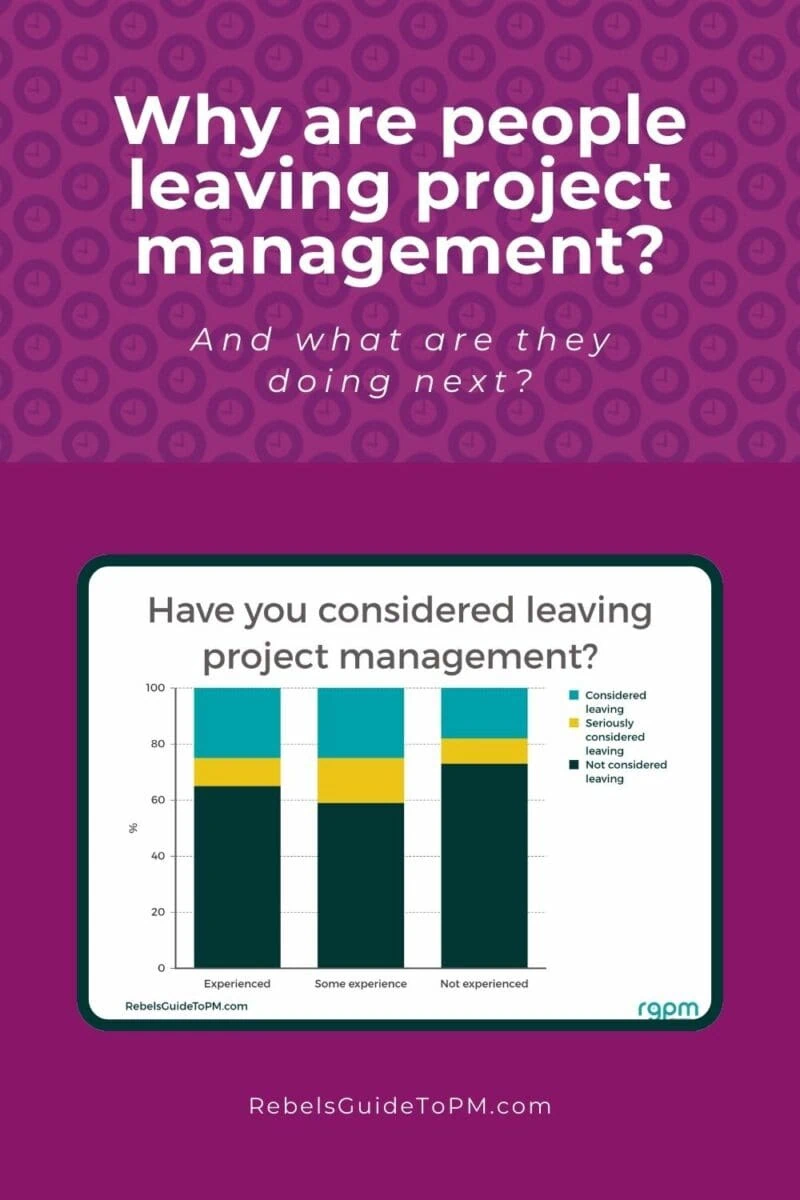Why are people leaving project management?
Nearly 1 in 5 project managers have considered leaving their job: 37% of professionals have thought about quitting project management in the past year.
The figures look even worse for those who identify as having ‘some project management experience’: 41% have considered or seriously considered leaving it all behind and finding a different career.
So why are people leaving project management? And what’s life like if you decide to quit?
I gathered some project management statistics from original research (thank you, blog reader community) and learned some scary facts: it’s hard out there for project professionals.
Let’s start with this story from one project manager.
I hate the fact that project management as a supplier is about delivering as little as possible for as much as the customer can pay, rather than a quality product. In my company the project managers are responsible for everything, yet in reality have little or no control over delivery resources. The buck stops with me but there are very few ways I can influence the direction of travel.
I need my life back, and need to wake up thinking I’m can make a difference at work, not dreading what is in the inbox or what disaster I’m going to have to make right today.
Some days I would rather drive a bus. Frustrating, disheartened, disillusioned doesn’t come close and honestly if it wasn’t for the pandemic I would have left some time ago.
Anonymous project manager
And that person is not alone. What’s going on with people wanting to leave their jobs as project managers?
Why do project managers quit?
This brain drain of project talent isn’t a new thing, although I imagine (from personal anecdotes and the stories I hear while I’m mentoring and training) that it’s probably worse now than it was a few years ago. But why are people leaving.
Nada Abandah commented on Twitter that she knew people who were leaving project management jobs. When I asked her why, she said they felt under-paid, under-appreciated and were fed up of being blamed for project failure.

The reasons to go
In my experience, people leave project management for these reasons:
- The work is too stressful with zero work/life balance (we now call this work/life integration)
- The team, senior management or executive level are disorganized with poor communication skills and that makes it hard to get anything done
- The organization doesn’t understand or value project managers and the project management process, and is not willing to invest in project performance management
- There is no career development… and a better opportunity comes up somewhere else
- The work isn’t what you were expecting and you don’t find it interesting.
Let’s look at those.
The work is stressful
Project management is stressful. There are peaks and troughs — Peter Taylor, AKA The Lazy Project Manager, talks about this in his book of the same name. He describes the life cycle of a project as busy at the start, busy at the end and coasting in the middle. If you set it up right, the project should pretty much run itself.
That can be the case, but it doesn’t stop the start and end bits being super stressful.
Here are some of the things project managers reported in the survey as wanting to learn more about:
- How to speak with clients with less stress
- How to keep the team motivated and how to manage stress
- How a manager can reduce stresses
See the trend? Causes of stress included:
- Workload levels are high
- Uncertainty in the future of my role
- Bullied by supervisor
- Working for a lying, manipulating ****
Work is made stressful by so many (often unacceptable) things, and ultimately project managers don’t want to deal with it any longer so they quit.
Read next: The truth about bullying in project management
Management makes it hard to get things done
The survey mentioned above gave people to talk about their biggest concern in project management and the results were eye-opening (and yet unfortunately not surprising). Here are some of the verbatim comments:
“Where does my ownership of the project end and the sponsor/business owner’s end and what sort of things should I be saying to get alignment? It often feels as if these stakeholders, despite having requested and business cased the project, want to remain arms length until it’s delivered.”
Someone else, who classified themselves as an experienced project manager leading more than 10 project team members commented:
“Top management, they are not following a specific approach, how to lead or manage the organization, just blaming and throwing the ball.”
The organization doesn’t want to improve PM maturity
When I first started work as a PM my colleagues and I joked about how no one understood what we did. How difficult it is to explain to someone what you do as a project manager became one of the 6 things I didn’t know about PM when I got into this profession. But there is a serious side to having a hard-to-explain job.
One respondent in a hybrid environment wrote:
“How to be a project manager in an environment where people don’t want to have a structured project and get their buy in and the use of PM tools? People (Directors) don’t understand what the true role of the project manager is.”
Is it any wonder that person’s top career goal for the year was to get another job outside their current company?
Another project manager working on 2-5 projects and who had ‘kind of’ considered leaving the profession said:
“Knowing how to get things done on time, under budget and with fantastic quality and customer success, but being handcuffed by those who cannot “see” how to do it. They won’t even let you show them how it can be done.”
The project managers I mentor are often struggling to do their job in an environment that doesn’t actually want project management. Perhaps they are the first PM at their company. Perhaps the organization didn’t expect moving to a structured way of working to be so hard. However much you tailor and go light on governance, there is still some prioritizing, organizing and compromise with which projects are done and how they get done. And some companies don’t want to accept that yet.
That’s a red flag for me. If they aren’t willing to learn from the experts they’ve recruited, it’s time to find a place to work where your experience and skills will be valued.
Need a mentor?
Book a power hour with me. Gain some clarity about your career or get support for a project in a one on one session.
There is no career development
Some of the verbatim comments in the survey told the story of project managers struggling to get taken seriously and being given the opportunities they thought they deserved. One respondent reported being given projects that were “not complex enough to warrant being good experiences from a professional development perspective.”
A hybrid project manager with a team of under 5 people once wrote:
“Not getting enough time outside work to focus on my personal development, I’ve missed the opportunity to get certified and attending of project management courses resulting in a unmet main career objective [for that year].”
When people feel under-utilized, they feel undervalued. And they’ll start to look for jobs where they can contribute to the best of their abilities in a way that feels meaningful for them. Where they can be confident the career path will take them where they want to go next.

You don’t enjoy the work
It’s fine to leave a career if you don’t enjoy it. Perhaps it wasn’t what you expected. Perhaps you find it repetitive. Perhaps you enjoyed it at the time but you’ve grown out of it now and want a different challenge. Your past experience was great but it’s time for something else. You’ve been a good project manager; you don’t have to stay one all your life, although many people do.
Leaving project management shouldn’t be something to consider as a bad move or a failure. If you’re ready to move on, for whatever reason, there are plenty of other jobs where you can use your project management skills. After all, most office jobs require you to be able to communicate, organize your team, engage with other people and plan and manage your tasks. You are highly transferable, my friend.
Read next: How to plan to leave your job
What other careers can project managers do?
Project managers leave their companies sometimes for other project, program or portfolio roles (a sideways move out of your current company but within PM), but if you are transitioning out of the profession totally, do not despair, there are plenty of jobs where your transferable skills are in demand. Time management, risk management, influencing organizational culture and having a positive impact on the people around you — these are all qualities that hiring managers look for, regardless of job title.
If you are wondering what next after project management, there really are a lot of choices. For example:
- Program manager
- Product manager
- Business analyst
- Risk manager
- Strategic advisor
- Change manager
- Consultant
- Business development manager
- New product development manager
- Client account manager
- Operations manager
- Release manager
Some of these are similar roles to project manager — anything in the change-related or transformation arena for example. But some moves will take you out of that environment completely, such as technical roles.
Practically any specialist area of your business needs people with decent management skills in leadership roles, so if you fancy moving into HR, Finance, Customer Service, Marketing or anything else, have a think about the types of projects you were involved with and whether there is a lateral move into that area. For example, if you did a lot of digital project management for the Marketing team, could you transition to a Marketing Exec role? Your next step could be across to the other side!
Your career choices are your own, and no one else can make them for you. What I can tell you though is that there is life after project management, and whatever you end up doing, hopefully the things you learn as a project manager will enhance your career, however it evolves.
Life is too short to do a job you don’t enjoy. If project management has run it’s course for you, it’s time to go.
What’s life like if you quit project management?
I can tell you from my experience that it’s good. Although I didn’t 100% quit project management or I wouldn’t be writing here! Instead, my opt out was from a senior project management job. So why did I leave a very good salary, lovely colleagues, responsibility and the company I’d considered home for over a decade?

